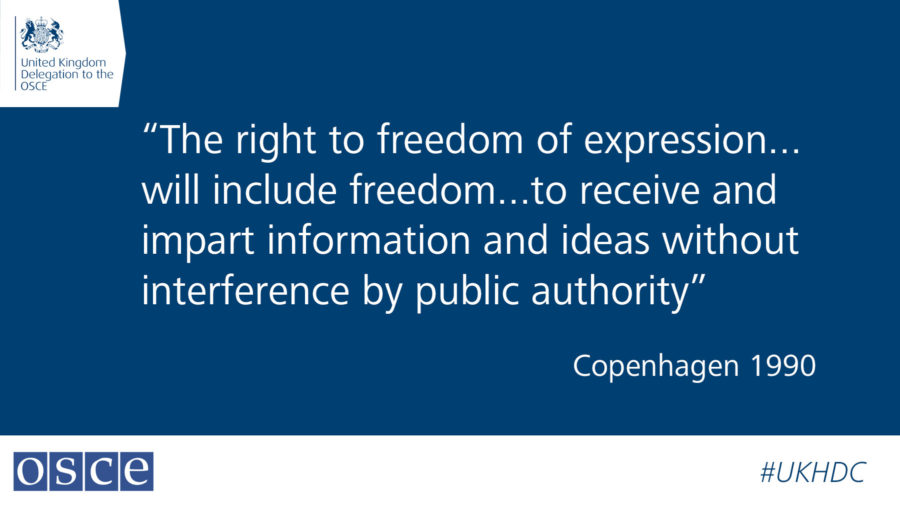2nd March 2017
Facts, Opinions and Falsehoods: Freedom of Expression in a ‘Post-Truth’ Age

Freedom of expression, enshrined in the Universal Declaration of Human Rights and international legal obligations, is one of the principles underlying the common ground upon which the Organization for Security and Co-operation in Europe (OSCE) was built.
From its earliest days the states of the OSCE (and its forerunner CSCE) were clear that this right encompassed a right to information.
‘The right to freedom of expression…will include freedom…to receive and impart information and ideas without interference by public authority’ Copenhagen 1990
This statement of intent was adopted at a time when glasnost in the Soviet Union had started to reverse decades of rigid state information control and, indeed, when democratic governments, including in the UK, were accustomed to less openness than is the current norm.
Although some states have retightened their grip on media, in most OSCE countries now a major challenge for the public is not lack of information but sifting and interpreting it. With 24 hour news, online media and social media providing immediate mass circulation it can be ever harder to distinguish fact from fiction. Such a crowded information landscape can be used not only to promote political views or obscure damaging facts. It can be deliberately exploited to sow confusion, create false credibility for disinformation and plant unwarranted doubts about the genuine.
The Oxford English Dictionary defined its word of the year ‘post-truth’ as ‘relating to or denoting circumstances in which objective facts are less influential in shaping public opinion than appeals to emotion and personal belief’.
‘Post-truth’ political campaigning has become something of an issue across the OSCE region. The need to verify information is not new: voters are accustomed to politicians highlighting facts or figures that support a particular argument. Tolerance levels may vary, but deliberate and blatant distortion of the truth is not generally acceptable in modern political culture. Honesty is a basic tenet for democratic institutions and essential for public trust in government and media.
Some media outlets have a long tradition of publishing fantastically improbable stories that they don’t expect to be taken seriously or to have wider consequences. But it can be harder to recognise distorted or false information deliberately crafted to influence attitudes, reinforce prejudice, affect our behaviour towards others or change our voting decisions.
Neither the right to freedom of expression nor to information is absolute. Under international law, states may impose limits in certain, narrowly defined circumstances for example in order to prohibit incitement to racial, religious or national hatred.
But the growth of ‘fake news’ and disinformation raises other questions, for example: Does the right to freedom of expression protect the deliberate dissemination of disinformation? Should the public be protected from such disinformation – and if so how? What are the respective duties and responsibilities of governments, media actors, social media companies, civil society organisations and individuals?
What is the role of the state – to educate, regulate or simply to block or censor false news and disinformation?
When the OSCE Human Dimension Committee meets on 3 March Dunja Mijatovic addresses us for the final time as Representative on the Freedom of the Media, after seven outstanding years. We will also invite views from states on how they respond to the challenge of disinformation, and from the OSCE Office for Democratic Institutions and Human Rights on assessing the media environment around elections.
The globalisation of information and the social media explosion have forced us to re-examine state and media roles, but they have also shifted greater responsibility for assessing information to us as individual members of the public. Our ability to tell fact from fiction matters.